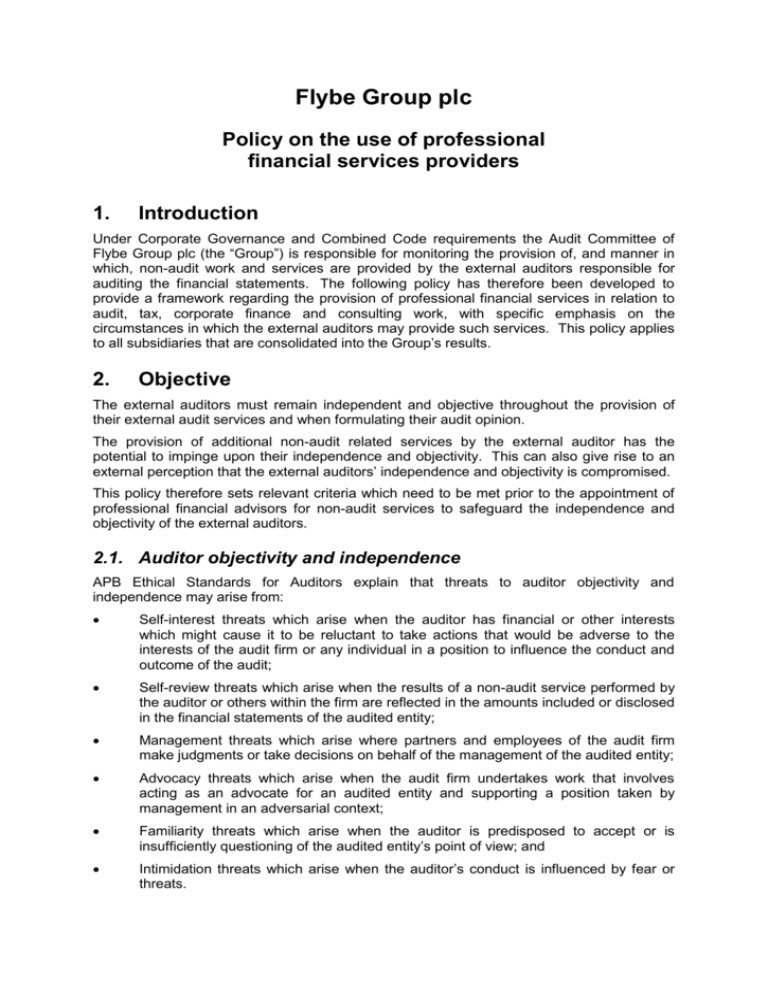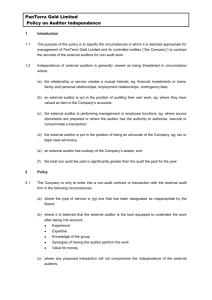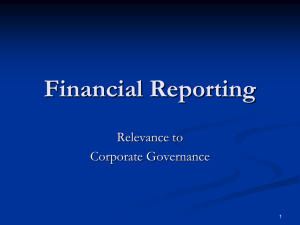Non-audit services
advertisement

Flybe Group plc Policy on the use of professional financial services providers 1. Introduction Under Corporate Governance and Combined Code requirements the Audit Committee of Flybe Group plc (the “Group”) is responsible for monitoring the provision of, and manner in which, non-audit work and services are provided by the external auditors responsible for auditing the financial statements. The following policy has therefore been developed to provide a framework regarding the provision of professional financial services in relation to audit, tax, corporate finance and consulting work, with specific emphasis on the circumstances in which the external auditors may provide such services. This policy applies to all subsidiaries that are consolidated into the Group’s results. 2. Objective The external auditors must remain independent and objective throughout the provision of their external audit services and when formulating their audit opinion. The provision of additional non-audit related services by the external auditor has the potential to impinge upon their independence and objectivity. This can also give rise to an external perception that the external auditors’ independence and objectivity is compromised. This policy therefore sets relevant criteria which need to be met prior to the appointment of professional financial advisors for non-audit services to safeguard the independence and objectivity of the external auditors. 2.1. Auditor objectivity and independence APB Ethical Standards for Auditors explain that threats to auditor objectivity and independence may arise from: Self-interest threats which arise when the auditor has financial or other interests which might cause it to be reluctant to take actions that would be adverse to the interests of the audit firm or any individual in a position to influence the conduct and outcome of the audit; Self-review threats which arise when the results of a non-audit service performed by the auditor or others within the firm are reflected in the amounts included or disclosed in the financial statements of the audited entity; Management threats which arise where partners and employees of the audit firm make judgments or take decisions on behalf of the management of the audited entity; Advocacy threats which arise when the audit firm undertakes work that involves acting as an advocate for an audited entity and supporting a position taken by management in an adversarial context; Familiarity threats which arise when the auditor is predisposed to accept or is insufficiently questioning of the audited entity’s point of view; and Intimidation threats which arise when the auditor’s conduct is influenced by fear or threats. Flybe Group plc 3. Professional financial services policy Additional services When considering the appointment of the external auditors for non-audit work, the following factors need to be taken into account: 1. The quality of work provided by the external auditors; 2. Representations provided by the external auditors regarding their independence and objectivity and internal controls implemented by them when providing non-audit services; 3. The level of understanding of the Group by the external auditors; 4. The nature of the work being performed; and 5. The commercial and practical circumstances of particular types of work required. In order to retain the option of utilising the external auditors to provide non-audit services, the following criteria also have to be met. These are that the external auditors do not: 1. Audit their own work; 2. Make management decisions for the Group; 3. Create a conflict of interest; or 4. Find themselves in the role of advocate for the company. This is defined by ICAEW guidance as “promoting or being perceived to promote an audit client’s position or opinion to the point where objectivity may be compromised”. In addition, before appointing the external auditors to undertake a particular non-audit service, consideration should be given to whether this would create a general threat to their independence. The external auditors should not be appointed if the threat is anything other than clearly insignificant, unless appropriate safeguards can be applied to eliminate or reduce the threat to an acceptable level. In this regard, the use of the auditors to provide other services will be limited under their own professional guidance established by the Audit Practices Board – see APB's Ethical Standard 5 - December 2010. In relation to specific services the following needs to be considered: 3.1. Audit-related services Audit-related services are those non-audit services specified as such in APB Ethical Standards for Auditors as including: Reporting required by law or regulation to be provided by the auditor; Reviews of interim financial information; Reporting on regulatory returns; Reporting to a regulator on client assets: Reporting on government grants; Reporting on internal financial controls when required by law or regulation; Extended work that is authorised by those charged with governance on financial information and/or financial controls performed where this work is integrated with the audit work and is performed on the same principal terms and conditions. The appointment of any professional financial service providers for audit-related services must be approved by the Chief Financial Officer or the Group Financial Controller. Page 2 of 4 Printed at 11:00 on 29/06/2012 Flybe Group plc Professional financial services policy 3.2. Tax consulting and advice It is the policy of the Group to select the advisor for each specific piece of tax consulting or advisory work who has the most appropriate skills and experience for the work required. The Group may choose to use a range of advisors for tax consulting and advice, including the external auditors where they are best suited to the work being undertaken. For the avoidance of doubt, tax compliance work will form part of the pre-approved services authorised by the Audit Committee. The appointment of any professional financial service providers for tax consulting and advice must be approved by the Chief Financial Officer or the Group Financial Controller. 3.3. General consulting and assurance services General consulting includes services in relation to acquisitions, disposals, pensions, special projects, strategic planning, legal matters, remuneration and other management consulting services. The Group will select an advisor after taking account of the skills and experience required, and the expected cost. For the avoidance of doubt, transaction support services may be provided by the auditor to the extent that they comply with the ASB’s ethical guidelines referred to above. The appointment of any professional financial service providers for general consulting and assurance services must be approved in the first instance by the Chief Financial Officer or the Group Financial Controller. The external auditors will only be considered if they are best suited to perform the work and meet the criteria set out above. 4. Prohibited services In general, any work that threatens the auditors’ independence should not be undertaken. In addition, the Group’s auditor will not be allowed to provide the following services: Accounting services (including calculation of the current or deferred tax positions and the design of their presentation in the financial statements); Restructuring services provided in any context which may involve a management role within the Group (e.g. as part of a troubled debt restructuring); Internal audit; Financial systems design and implementation; Valuation services (including actuarial valuations); Underwriting; and Any management role in relation to any Group entity. Restructuring services are any non-audit services provided to the Group in connection with the Group’s development or implementation of a transaction or package of transactions (a ‘restructuring plan’) designed to change its equity or debt financing structure, corporate structure or operating structure. 5. Prohibited fee structures The Group will not enter into any arrangement with its external auditor where the level of fee for a non-audit service is contingent on the outcome and where the fee is material to the firm. In addition, the Group will not enter into an arrangement where the outcome of the Page 3 of 4 Printed at 11:00 on 29/06/2012 Flybe Group plc Professional financial services policy service (and therefore the fee) is dependent on a future or contemporary audit judgment relating to a material matter in the financial statements of the Group or on a new or uncertain tax law interpretation. 6. Approval process for services to be provided by the auditors Where the auditors are selected to provide a service other than audit, prior approval from the Audit Committee is required where the fee (excluding expenses and VAT) is likely to exceed £10,000. Services should not be broken down into sub-projects in order to avoid this limit being breached. The project sponsor (defined as the Executive responsible for commissioning the service) should seek initial approval to use the auditors to provide non-audit services from the Chief Financial Officer or the Group Financial Controller. Once this has been obtained, the Chief Financial Officer or the Group Financial Controller will be responsible for seeking the approval of the Audit Committee. Work on the project may not commence until the Audit Committee has given its approval. Where the fee exceeds £50,000 (excluding tax compliance fees) cumulatively in any one financial year, the Audit Committee must be informed and their prior approval to exceed that limit is required irrespective of whether or not the fee for that project would exceed the £10,000 level. 7. Reporting to shareholders The annual report should: describe the work of the committee in discharging its responsibilities; set out the audit committee’s policy on the engagement of the external auditor to supply non-audit services in sufficient detail to describe each of the elements described in paragraph 4.30 of the FRC’s Guidance to Audit Committees published in December 2010, or cross-refer to where this information can be found on the Group’s website; set out, or cross refer to, the fees paid to the auditor for audit services, audit-related services and other non-audit services, including disclosing pre-approved non audit services and those requiring specific approval. Where necessary, fees for prohibited services should also be disclosed); and if the auditor provides non-audit services, other than audit-related services, explain for each significant engagement, or category of engagements, what the services are, why the audit committee concluded that it was in the interests of the Group to purchase them from the external auditor (rather than another supplier) and how auditor objectivity and independence has been safeguarded. Page 4 of 4 Printed at 11:00 on 29/06/2012







